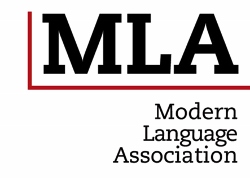
17th-, 18th- and 19th-Century Italian at the MLA (Philadelphia, January 5-8, 2017)

The MLA's Forum for 17th-, 18th- and 19th-Century Italian invites proposals for the following sessions at the 2017 annual convention in Philadelphia (January 5-8)
1. The Boundary Conditions of Genre
The 17th-19th centuries were a time of great genre flourishing: the novel, periodical, opera, autobiography, encyclopedia and almanac came into being, to name only a few. Also, boundaries of established literary forms flexed to accommodate new cultural impulses, leading to numerous hybrid types. We invite papers that examine specific genres, in terms of the contexts for their emergence, the conditions of their thriving and/or demise, the incidence of certain authors on particular modes. Send title and 300-word abstract to Adrienne Ward (aw7h@virginia.edu) by March 15, 2016.
2. Giacomo Leopardi on the Edge
Giacomo Leopardi's oeuvre challenges disciplinary distinctions and the limits of conceptual categories. This panel will bring together scholars interested in exploring in detail examples of how Leopardi blurred and probed the boundaries between philosophy and poetry, philology and history, modernity and antiquity, Enlightenment and Romanticism, human and non-human, nature and culture, etc. We invite papers that look at these or similar intersections/convergences. Comparative approaches are especially welcome. Send title, 300-word abstract, and a brief bio to Sabrina Ferri (sferri@nd.edu) by March 15, 2016.
3. The Technologies of Creative Spaces
Investigates literary representations of both the creative spaces of the 17th, 18th, and 19th centuries – where space may be any locus of innovative thinking or production (salon, farm field, theater stage, factory, printer/bookseller, military camp, "republic of letters," e.g.) – and the various technologies that availed such production. "Technologies" denotes a wide range of possible expedients, from mechanical (such as machinery, implements) to conceptual (systems, classifications, original notions) to corporal (dance, battle, torture maneuvers). We invite papers that focus on the specific methods employed to generate solutions in the many creative spaces of this period. Send title, 300-word abstract, and a brief bio to Adrienne Ward (aw7h@virginia.edu) by March 15, 2016.
Associate Prof. Italian
Director, Study Abroad Programs in Italy (CET-Siena and ISI-Florence)
Dept. Spanish, Italian and Portuguese
University of Virginia
PO Box 400777
461 New Cabell Hall
Charlottesville VA 22904 USA


